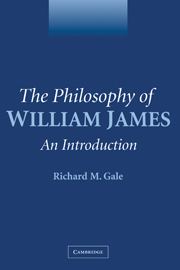Book contents
- Frontmatter
- Contents
- Preface
- Introduction
- PART I THE PROMETHEAN PRAGMATIST
- PART II THE PASSIVE MYSTIC
- 8 The Self
- 9 The I–Thou Quest for Intimacy and Religious Mysticism
- 10 The Humpty Dumpty Intuition and Backyard Mysticism
- 11 An Attempt at a One World Interpretation of James
- Bibliography of Works Cited
- Suggested Further Readings
- Index
8 - The Self
Published online by Cambridge University Press: 06 January 2010
- Frontmatter
- Contents
- Preface
- Introduction
- PART I THE PROMETHEAN PRAGMATIST
- PART II THE PASSIVE MYSTIC
- 8 The Self
- 9 The I–Thou Quest for Intimacy and Religious Mysticism
- 10 The Humpty Dumpty Intuition and Backyard Mysticism
- 11 An Attempt at a One World Interpretation of James
- Bibliography of Works Cited
- Suggested Further Readings
- Index
Summary
James's promethean pragmatic self, being a restless, indefatigable desire–satisfaction maximizer, was seen in Part I to be always on the make in his quest to have it all. Toward this end he had to adopt an externalized stance toward worldly objects, since his concern was with successfully manipulating them for his own purposes. His pragmatic theory of meaning and truth supplied him with recipes for successfully riding herd on them. In addition they served as a univocal methodological reconciler or mediator between the projects and interests of his many different selves, but only a partial reconciler since conflicts still remained between the perspectives of these selves, especially those of the moral agent and scientist with regard to the issue of determinism, free will, and bifurcationism. The stronger medicine of a Poo-bahistic ontological relativism was needed, requiring him never to go anywhere or do anything without being armed with a “qua”-clause. Even the doctrine of Pure Experience, which turned out to be a failed though noble experiment, had a reconciling intent within the world of sensible objects. The will-to-believe doctrine served his promethean self by permitting him to believe in epistemically undecidable matters, such as that God and free will exist, in a manner that would enable him to be an active agent in bringing about the flourishing of his many selves. It doesn't get any more promethean than this.
- Type
- Chapter
- Information
- The Philosophy of William JamesAn Introduction, pp. 159 - 177Publisher: Cambridge University PressPrint publication year: 2004



